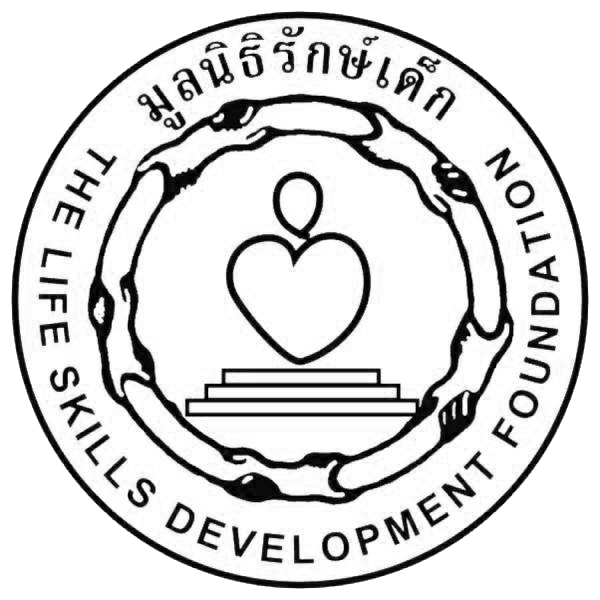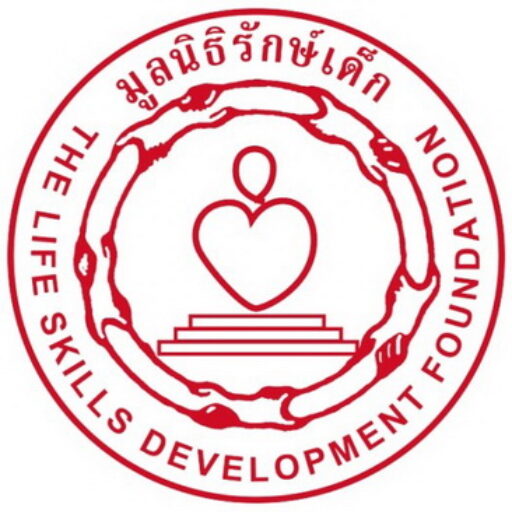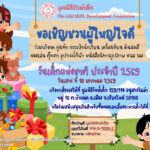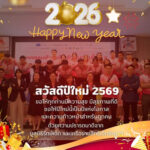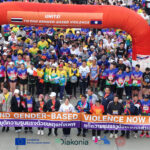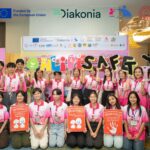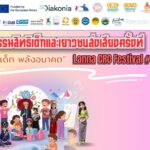The Life Skills Development Foundation (TLSDF) is a registered Thai non-profit and non-governmental organization (NGO) that aims to improve the quality of life for vulnerable children and their families in northern Thailand. TLSDF’s mission is to empower and build the capacity of the individuals and groups responsible for ensuring the basic rights of children (survival, protection, development, and participation) in accordance with the UN Convention on the Rights of the Child (UNCRC).
Vision Statement: “Rights for Every Child”
We would like to see every child in our impact areas enjoy their inherent rights to a good quality of life and life skills acquisition, protection from abuse, discrimination, and neglect.
Mission:
TLSDF’s overall mission is to empower and build the capacity of the individuals and groups responsible for ensuring the basic rights of children (survival, protection, development, and participation) in accordance with the UN Convention on the Rights of the Child (UNCRC).
Our mission at the program level is to ‘Promote Rights of the Child and Life Skills Education with and for Disadvantaged Children, especially Right to Quality Education to enhance their fullest potential development, reducing risk behaviors and factors that may harm their Quality of Life.
Key TLSDF’s strategies are;
- Provide UNCRC-based life skills education, and training to children, youth, women, and families to encourage holistic development.
- Promote and support community participation in the sustainable development of child rights activist groups, and life skills programs.
- Create an inclusive Upper Northern Thai advocacy coalition to prompt widespread change and bring greater awareness to children’s rights.
- Conduct operations in collaboration with other local, national, and international organizations for the greater public benefit.
- Advocate for a strong voice of children by facilitating child rights movements, promoting innovative programs, and advocating better policies for and with children in the country and internationally.
- At present, TLSDF is striving to address 4 child rights themes: Ending all violence against children, Online child protection, promoting child rights in a healthy environment, and protecting the rights of migrant children.
To ensure project sustainability, as well as the interests and personal agency of children as rights holders, TLSDF employs community-based collaborative frameworks between governmental and non-governmental organizations with a focus on empowering community members. The projects engage with all phases of childhood from before the child is born, working closely with expecting mothers throughout their pregnancies, to early childhood care and development, through family parenting, village daycare centers, and kindergarten schools. Promoting “Know your Rights’, ‘Know your Root’, and ‘Know your World”; key life skills educational themes with elementary and secondary school up until the age of 18.
Most of TLSDF’s projects work with ethnic, indigenous, and migrant populations situated in areas affected by serious poverty and issues of statelessness among other challenges particularly because the majority of the populations are residing in the remote, high hills and border areas of Thailand and Myanmar.
Since 2005, our Early Childhood Care and Development (ECCD) and Community-based collaboration to provide Care and Support for Orphaned and Vulnerable Children (OVC) programs worked with these hard-to-reach populations, many of whom are often overlooked by wider societies. In 2010, our Organizational Development with Child Rights Programming (OD-CRP) began to promote ‘Child Rights Governance Framework’ with local partner organizations, and in 2014 our ‘Promoting Child Rights to Participation’ program (PCRP) empowered many ethnic, indigenous, migrant and stateless child-led groups, and their adult guardians to voice their concerns regarding Thai nationality and human rights entitlement. In the same projects sites, during 2007 – 2016 our ‘Life Skills Based Quality Education Enhancement’ (LSQE) program worked with 20 state primary schools serving about annually 3,300 students who are from at least seven different ethnic and indigenous groups in Maehongson province, which also includes many non-Thai national children.
During 2011 – 2013, TLSDF gained stronger experience working for HIV-affected and vulnerable children as a Sub-recipient organization of the Comprehensive HIV/AIDS Care, Support and Social Protection for Affected and Vulnerable Children Living in High Prevalence Area to Achieve Full Potential in Health and Development: CHILDLIFE supported by Global Fund ATM round 10 in Thailand. TLSDF is responsible for the implementation of community strategies in 3 provinces in the Upper North namely Nakhonsawan, Chiang Rai, and Payao. This project outcome was not only addressed the problems and needs of children affected by HIV/AIDS (CABA) and vulnerable children but also strengthened the community-based child protection mechanism in 29 provinces and brought up its good practices into the National Child Protection Amendment law in later years.
During the year 2016 – 2018, TLSDF was one of the key partners with Save the Children Thailand and ran the ‘Eliminate All Physical and Humiliating Punishment’; EAPHP. The project combined in-country and regional intervention with the specific goal for Southeast Asia to ‘Reduce the prevalence of PHP in all settings in the targeted Asian Region countries’ with its first expected results; the coordination mechanisms between regional level platforms (ASEAN) and CSOs to eliminate PHP are strengthened by improvement of knowledge and experiences sharing among CSOs and cross – country collaboration regarding EAPHP. With support from the Swedish International Development Corporation Agency (SIDA) and managed by Save the Children Thailand, TLSDF is responsible for implementing both in-country strategies and engaged partially with regional strategies. The project made greater momentum by bringing up grassroots communities to meet policy policy-making level at the National platform for EAPHP advocacy goals, unfortunately, the project was phased out at the end of 2018.
In 2019-2020, TLSDF was enabled to maintain 6 child rights promotion and protection projects [Survival, Development, Participation, and Protection] (ECCD/OVC/Child-Friendly Community; CFC / DMAP/ E-ICE/ Living Fund) operating in hard to reached communities addressing problems and needs of ethnic and indigenous children who are vulnerable and at-risk situations by working in collaboration with local GO and other CSO organizations. Reached out to 2400 migrant and ethnic adolescents with life skills – Fact of Life; Child Rights, Educational and Career Pathways, Reproductive Health Care, and Legal Status development in Fang district of Chiang Mai. Provided Positive discipline training for 80 parents and community leaders at the Nakhonjedee sub-district of Pasang, Lamphun. Additionally, we facilitated UNESCO – CWR; Capacity Building Workshops on addressing school-related gender-based violence with the Connect with Respect Programme and positive discipline to prevent gender-based violence in Thai schools. 210 schoolteachers of 5 schools in the following provinces: Chiang Rai, NakhonSrithamarat, Rayong, Singburi, and Sisaket.
Particularly in the year 2020, we launched our new humanitarian response program in regard to the COVID-19 outbreak; 1.) Distributing protective tools; soap bars, hands washing gel, face masks, etc., and COVID-19 risk communication messages in 5 languages; Thai, Shan, Lahu, Lesu, and Karen. 2.) Providing training on how to produce hands washing spray, face shield, and disinfectant liquid 3.) Distributing relief kits worth 700 Thai Baht for the most affected children and families in particular the migrant people. We reached +60000 ethnic and migrant families and delivered more than 750 relief kits.
Our practical achievements are listed.
- 1. Building one new village daycare center
- 2. Strengthening community-based child care, development, and protection mechanisms in 8 sub-districts
- 3. Modeling community-based prevention and addressing problems of unwanted adolescent pregnancy in ethnic and Indigenous populations in one district
- 4. Initiated comprehensive quality of life development program for migrant adolescents; Sport for Development, Life Skills Education on 5 thematic issues (Child Rights, Reproductive health, Educational Pathway, Career Pathway, and Legal status development)
- 5. Formed 4 migrant women self-help groups (SHG) comprising 55 members in the Nonghan sub-district of Sansai.
- 6. Provided Living fund, safe home building, and top-up funding for heart disease surgery
- 7. Worked with ethnic and migrant populations to prevent and control risks and exposure to COVID-19 and delivered relief kits for the most affected children and families
TLSDF’s Networking and Partnerships
- TLSDF is one of the founding members of the Indigenous Education Network (IEN) and an affiliate NGO of the Indigenous People Network. Our key role is to introduce and provide capacity building on child rights programming to the network programs. Joint advocate for the Rights of Indigenous peoples and their children who struggle to fulfill their inherent rights while promoting life skills education and child rights to participation with and for the Indigenous youth network, TKN.
- TLSDF is a steering committee member for CRC Coalition Thailand, the child rights-focused CSO/NGO network as a national coalition that advocates child rights principles and NGOs’ good practices into mandated government agencies, striving to monitor the government policy and program that promote and protect child rights.
- Since 2012, TLSDF is one of the founding members of Child Rights Coalition Asia (CRC Asia); The Child Rights Coalition Asia is a child rights coalition working at the regional level. It is composed of child rights and human rights organizations working to mainstream child rights perspectives and agendas into national, regional, and international advocacy processes. TLSDF’s child rights advocacy activities at the National level are reinforced by CRC Asia’s agenda at the regional and international level.
- Regarding to TLSDF programme implementation at grass root level, we also work in collaborates with other NGOs networks such as the Legal Status Network Foundation, IMPECT, ECPAT, World Vision, Alternative Education Network etc.
- In 2019, TLSDF’s has been initiatory convened the collaborating network of child rights focused government and non-government agencies in three Upper northern Thai provinces namely Maehongson, Lamphun and Chiang Mai. The network is called ‘Lanna CRC Coalition’, and together we expected to utilize this great momentum to elevate and making higher impact for our child rights promotion and protection especially dealing with post-COVID-19 era.
Our current projects include:
- Early Childhood Care and Development (ECCD), a program that focuses on working with volunteer community health educators, daycare centers, kindergarten teachers, and young mothers, to ensure that mothers and children age 0-6 have access to quality healthcare and that children receive developmentally appropriate care and a holistically supportive quality education.
- Orphaned and Vulnerable Children (OVC), which uses social protection strategies to work with community groups, government officials, and families to implement child protection mechanisms to serve children facing physical, emotional, and/or sexual abuse, and neglect.
- Ethnic and Indigenous Children Empowerment by Enhancing Education on Child Rights for Reproductive Health, Attaining Legal Status and Protection from Human Trafficking: EICE – PROCEED, which focuses on providing comprehensive life skills education on child rights, reproductive health, statelessness and citizenship, human trafficking, to lead a healthy and happy life for school children from 7 highland ethnic groups—Shan, Pa’o, Lisu, Red and Black Lahu, Hmong, and Karen.
- Development of Migrant Adolescent and Participation (DMAP), the project will collaborate with all local authorities in Fang district to mobilize their support and deliver direct service with structural change at local levels, while we will also work with local government authorities, and private sector to address migrant youth issues and empower children to participate and advocate at local, provincial, and national levels for their own concerns. Apart from structural approach and policy advocacy, another goal of this project is to create community engagement, and empower migrant adolescents for better educational, psychosocial and legal conditions.
- “Empowering Migrant Community Volunteers (MCV) and Youth Leaders (MYL) to Work with and for Their Peers and Families Mitigating Impacts of COVID-19”, We will work with our existing networks of migrant volunteers and youth leaders to reach out to migrant families, and high hill ethnic indigenous communities, providing psychosocial support, COVID-19 risk information, and health equipment like masks and soap. Additionally, TLSDF will identify families needing urgent assistance and provide them with both a living fund, and financial support for education expenses.
- “Migrant Women Empowerment for Children’s Health Care and Development Promotion (MWEC) support by KNH Germany, our pilot project in 2020 – 2021, we are reaching out to migrant women, discover their potentials, facilitate the Women Self-Help group formation process’s activities, and discuss their current situations against the Rights of all migrant workers and members of their families (children) particularly on health care, educational opportunity, and legal status of their children. The women self-help group development, their voices, and their concerns on health care and education issues will inform their future plans in which facilitating by the project team for a greater development of their children.
- Pediatric and Family Cardiac Program, which provides life-saving cardiac surgeries for children and adults who lack the resources to pay for the healthcare they need, and builds knowledge amongst the public and health care personnel on heart disease.
- “Empowering Ethnic Child Rights Youth Activists to Promote Children Rights to a healthy environment” project (EECR). We envisioned that the youth group will be proud of their innovative actions as child rights youth activists and/or human rights defenders, who were enabled to strive as role model with their critical and creative thinking as leaders in natural preservation and environmental concerning activists.
- Organize the Thailand In-Country Children’s Meeting on Digital Environment titled on “Upholding Child Rights to Participation in the Virtual World” to serve as both skills building on child rights advocacy competencies for young human rights defenders and a platform of child participation addressing child rights in digital environment.
- Organize the Thailand In-Country Children’s Meeting on civil registration and vital statistic (CRVS) to provide inputs for the Second Ministerial Conference on Civil Registration and Vital Statistics (CRVS) in Asia and the Pacific.
- ‘The Living Fund and RakDek Safety Home Building’ is a program which provides urgent funds for food, clothes, school supplies, and healthcare for vulnerable children on a case-by-case basis. TLSDF operate this project in all its operating communities with support from public donation boxes and private donors.
TLSDF was founded in 1998 as part of the Save the Children USA’s transition strategy when it closed down its operational presence in Thailand. In 1999, in collaboration with Thailand’s Office of National Primary Education Commission (ONPEC), UNICEF, and Save the Children, TLSDF played a lead role in the initiation, development, and introduction of the ‘Child Friendly School Program’ concept in Thailand. This concept has since been expanded to over 1,000 schools throughout Thailand and 40 countries in the Asia-Pacific region through a partnership between Johnson & Johnson and Save the Children (USA). TLSDF currently operates in 3 provinces of Upper northern Thailand; Chiang Mai, Lamphun and Maehongson with parallel Child Rights advocacy projects at National and International levels. Our headquarters are based in Chiang Mai, and we have satellite offices in Fang and Pang Mapha.
At present, TLSDF has 6 program staffs, 3 office staffs, and 1 one executive director working with around 170 community volunteers and 100 youth leaders. Among program staffs, there are 2 senior project coordinators who have over 15 years of experiences working on child rights focused programs with non-government organizations, while the rest 4 of them have 2 – 6 years of experience working as TLSDF’s program coordinators. Our office manager has more than 19 years of experience working on NGO’s office management, accounting, and financing that align with the standard of practices of several international donors and UN agencies such as UNICEF Thailand, UNESCO, Save the Children, Give2Asia; Asia Foundation, Global Fund ATM, IFRC-EU, KHN Germany, etc. TLSDF’s executive director is former Save the Children (USA)’s specialist for children and youth development, and has tremendously runs TLSDF’s programs for 22 years. We are well acknowledged by government agencies, NGO’s networks both in country and international levels.
For more information, please contact:
Kreangkrai Chaimuangdee
Executive Director
The Life Skills Development Foundation (TLSDF)
159/114 Anusarn Villa T.Padeat A.Mueang Chiang Mai 50100
Thailand.
Tel: +66 53 212 757
Fax: +66 53 212 758
Personal cell phone: +66 818 828 231
Skype: cmd.kk
E-Mail: tlsdfrd2021@gmail.com, kkcmdoou@gmail.com
www.rakdek.or.th
